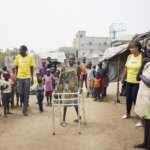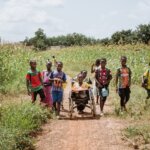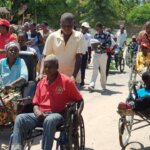- Disability Rights
- Humanitarian Action
Too often invisible, too often forgotten, too often overlooked.
Millions of people are fleeing civil war in Syria. Children, women and men have left their homes to seek safety and protection elsewhere, either in their own country or abroad. The severity of this conflict has led to the largest refugee situation of our time – whether within Syria, the region and beyond: as we also witness in Europe.
The number of Syrians arriving in Europe seeking protection continues to increase. However, with about 10 % of the total number of refugees it remains relatively low compared to Syria’s neighboring countries Lebanon, Jordan and Turkey. Since the brutal conflict started, these countries have been hosting the majority of the Syrian refugees.
In the small bordering country Lebanon more than 1.3 million Syrian refugees live either in refugee camps managed by the United Nations High Commission on Refugees (UNHCR) or – to a larger extend – under miserable conditions among the host community. The services provided to them by the Lebanon government and international agencies are by far not adequate to meet their basic needs.
Imagine being a person with a disability in that situation
Among the millions of refugees, some groups are particularly vulnerable, including people having suffered trauma, injury or people with disabilities. According to a study by Handicap International and Help Age these groups amount to 30% of all refugees. Persons with disabilities face additional barriers to access humanitarian assistance in crisis situations, conflict and war. They are at higher risk of violence, exploitation and exclusion from available services. In addition, the conditions in the refugee camps lead to an increased amount of the population being at risk of impairment due to poor nutrition and illnesses.
‘Too often invisible, too often forgotten, and too often overlooked, refugees with disabilities are among the most isolated, socially excluded and marginalized of all displaced populations’, alerts Antonio Guterres, United Nations High Commissioner for Refugees.
How do we address the increased vulnerability of refugees with disabilities?
LIGHT FOR THE WORLD has joined Handicap International in supporting the most vulnerable of conflict affected persons and their families in Lebanon.
Together we are addressing the needs of those who are older, injured or living with disability, by ensuring access to physical and functional rehabilitation services as well as psychosocial support.
As the war in Syria drags on, people continue to run for their lives and the amount of displaced population increases. ‘It is high time to increase inclusive humanitarian and development aid and support for countries like Lebanon and Jordan’, says Rupert Roniger, International Director of LIGHT FOR THE WORLD.
LIGHT FOR THE WORLD advocates towards states around the world receiving refuges to not forget about the most vulnerable groups, including refugees with disabilities.




